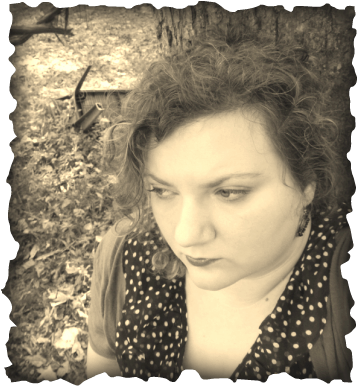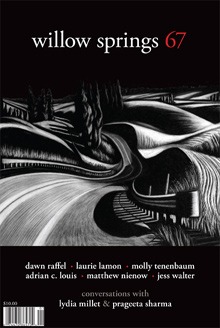
About Natalie Sypolt
Natalie Sypolt lives and writes in West Virginia. She received her MFA in fiction from West Virginia University in 2005 and currently teaches writing at WVU. Her work has appeared in various journals, including Kenyon Review Online, The Queen City Review, Flashquake, Potomac Review, Oklahoma Review, and Kestrel. Natalie’s writing has received several awards, including the 2009 West Virginia Fiction Award from Shepherd University, judged by Silas House, and the 2009 Betty Gabehart Prize sponsored by the Kentucky Women’s Writers Conference. Her stories have also been honored by writers Ann Pancake, Amy Greene, and Bobbie Ann Mason. Her story, “Love, Off to the Side” (published in Still: The Journal) has been short listed for the Pushcart Prize. Natalie’s first collection of stories, tentatively entitled Kitchen Accidents, is currently seeing a home.
A Profile of the Author
Notes on “Lettuce”
I wrote the first draft of this story nearly in one setting. This is my favorite way to write stories, though it seldom happens, and it always feel like a sort of gift when it does.
This story was inspired by a poem called “Everything Good Between Men and Women” by CD Wright. I was listening to the podcast “Poetry Off the Shelf” from the National Poetry Foundation on my way home from work one day, and Wright was the featured poet. I had the first pages of the story written in my head before I entered my driveway.
Of course, there has been much research. I’ve been really nervous (and still am, actually) about getting important things, like the information about Chris’ prosthetic arm, right. Taking on a story of a veteran who has brought home wounds-both those that are visible and those that are not-is not something I take lightly.
I also must mention the awesome writer Ann Pancake who worked with me during the West Virginia Writers Workshop in Morgantown, WV last summer. She helped me tweak this story and refine some rough edges; most of all, though, she gave me confidence that this was a good piece that people would want to read. Both she and the incredible Appalachian writer Silas House have been so instrumental to my writing career thus far and I can’t thank them enough.
Notes on Reading
I don’t read as much as I would like to, or as much as I should. This is a constant source of frustration for me, and I’m guessing also for many writers who also teach in order to survive financially. I enjoy my classes, helping students refine their writing and come to the understanding that words really are important-that they really do matter. Unfortunately, though, between August and May each year, what I read the most of is drafts of undergraduate essays. For those reasons, it can take me quite a while to finish a book, and when I do get the opportunity to read, I don’t want to squander that time reading something I’m not completely in love with.
I’ve recently really enjoyed two collections of short stories out of Greywolf Press: Mattaponi Queen by Belle Boggs and Volt by Alan Heathcock. Heathcock is currently getting a lot of buzz (including a review in the NY Times), and it’s well deserved. His collection is truly impressive. Both of these are collections of connected short stories- connected sometimes by character, but always by place. I suppose I’m attracted to these books because having a strong sense of place is also something that is so important to me and my writing. My current “collection” of stories is not a linked collection, but I’m interested in creating a cycle of stories someday.
Also very important to me are the writers Ann Pancake and Silas House, who are currently showing the literary world that Appalachian literature is alive and strong. Ann’s book Strange as this Weather has Been is incredible. Not only does she tackle timely and crucial issues (like Mountaintop Removal), but her sense of language always amazes and inspires me. Her writing is lyrical, beautiful, and so real to the people she’s describing. I’ve been lucky in the past two years to meet both Ann and Silas through writing contests that they’ve judged and am continually impressed by their work, both as writers and as voices for Appalachian issues (which, really, are also important American issues).


